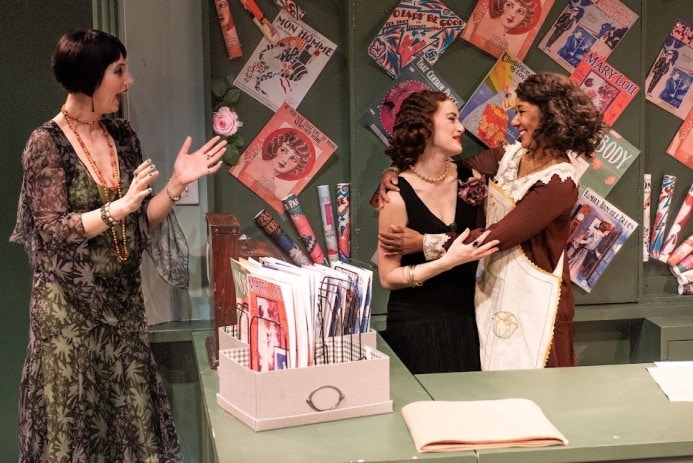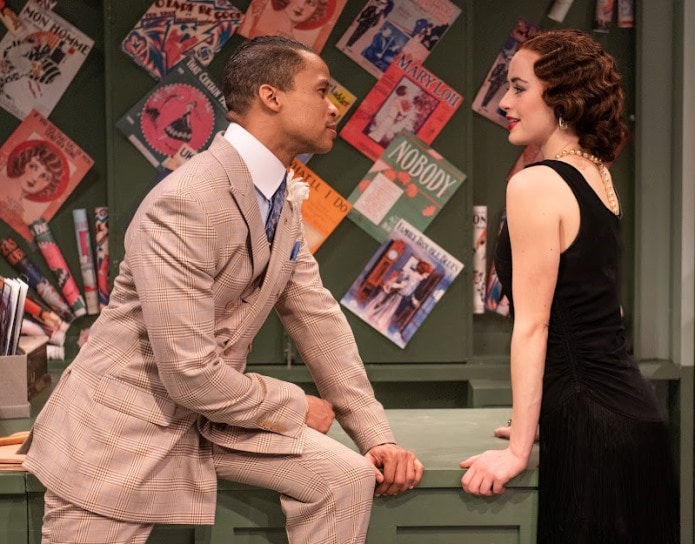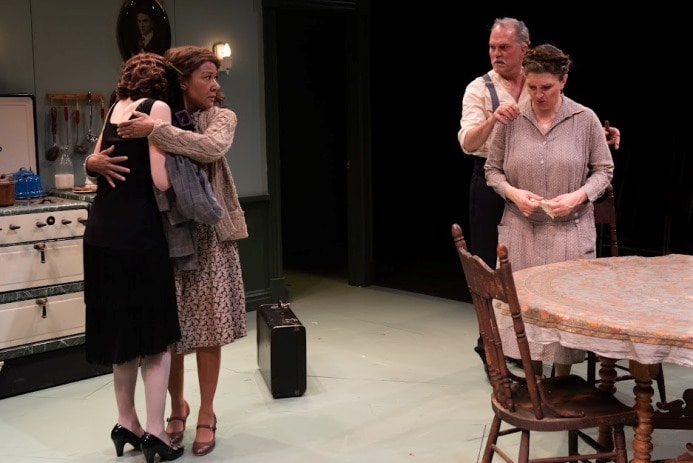Best known for her 1943 semi-autobiographical coming-of-age debut novel A Tree Grows in Brooklyn (which served as the inspiration for two movies and a musical), author Betty Smith was also a devoted playwright, whose first love was the theater. In 1931, while attending the University of Michigan, the Brooklyn native received the Avery Hopwood Prize for her play Francie Nolan; its eponymous character, a fictionalized version of herself, would later be the name of the central figure in her signature best-selling book. But before that, she changed the title of the play to Becomes a Woman, to reflect its theme and narrative. It remained unpublished and unproduced until it was rediscovered by Mint Theater Company – in keeping with its motto, “lost plays found here” – and brought to the New York City Center stage for its current world-premiere Off-Broadway engagement.

When the three-act play opens, Francie is an attractive and innocent, fearful and cautious nineteen-year-old working as a singer and salesgirl at the sheet-music counter of the local five-and-dime and living in Brooklyn with her unrefined working-class Irish-Catholic family, to whom she gives the bulk of her weekly salary. By the end, a year later, she is a brave, empowered, and independent young woman, no longer afraid to stand up for herself against the man, parents, and boss who maltreated her. What transpires in between (no spoilers here!) shows not only the development of Francie’s character, but also the social issues of discrimination, abuse, shaming, and exploitation based on gender and class, and the value of true friends who offer understanding and support through the best and worst of times.
Directed by Britt Berke, the Mint’s production is presented in the authentic style of a period-piece, with over-the-top melodrama and outdated humor, and language and behavior that are decidedly old-fashioned, while simultaneously displaying the foresight and acuity of Smith’s bold feminist perspective and a progressive message that, in historical hindsight, was well ahead of its time. Starring as Francie Nolan is Emma Pfitzer Price, in an impressive Off-Broadway debut that captures the personality, motivations, and forced maturation of the protagonist, through a believable range of shifting emotions, reactions, and inter-relationships.

Price also delivers melodious vocals on a selection of vintage songs, accompanied on piano by her competitive and gossipy co-worker Florry (played for the derisive laughs by Pearl Rhein), who is jealous of all the attention she gets and the dates she turns down from the men who come into the store. In contrast to Florry is the older, wiser, and more compassionate Tessie (the irresistibly empathetic Gina Daniels), who works with Francie and boards with the family (for reasons that are soon revealed), provides solid friendship and advice, and stands by her when others won’t – as does her loving good guy Max (Scott Redmond filling in for Jason O’Connell at the performance I attended, who looked a bit young for the role but brought the requisite warmth, sensitivity, and respect) – providing hope and stability for the future.
In the roles of Francie’s chief antagonists are Jeb Brown and Antoinette LaVecchia as her blustery bullying father and submissive mother, whose coarse behavior and judgmental attitudes are dramatically overblown and histrionic; Peterson Townsend as Leonard Kress Jr., the suave and seductive son of the store’s owner, who charms the naïve Francie with his fine clothing and sophisticated air, then shows his true colors in his changed demeanor and facial expression that speak volumes; and Duane Boutté as the equivocating Leonard Kress Sr., who fails to persuade the now strong and self-possessed Francie to do what he wants for his son.

Rounding out the ensemble are Christopher Reed Brown, Jack Mastrianni, Tim Webb, and Madeline Seidman as the assorted patrons of the shop and the men who at first want to date Francie then shun her, and the hilarious Phillip Taratula as the agent negotiating a questionable cabaret contract that would pay extra for exposing her personal life and for being “undraped” (calling it “art,” not the sexploitation that it is).
The show’s redolent design transports us to the era, with period costumes by Emilee McVey-Lee that include flapper-style dresses for the women and spats for the men, and clearly distinguish between the attire of the upper- and lower-class characters. Vicki R. Davis’s cleverly configured sets and props by Chris Fields (with colorful sheet-music graphics by Hey Jude Design, Inc.) are changed during the two intermissions (from the store to the Nolans’ apartment to the subsequently reconfigured space taken over by Tessie, Max, and Francie), in full view of the audience, adding opportunities for theatergoers to experience the workings of the production. Also contributing to the historical sensibility of the show are lighting by M.L. Geiger, sound and original music by M. Florian Staab, dialect coaching by Amy Stoller, and intimacy and fight direction by Cha Ramos.

To celebrate the decade of Becomes a Woman, the Mint is offering free streamings of its previously recorded live productions of two other American plays from the 1930s: George Kelly’s 1931 comedy Philip Goes Forth, available now through March 19; and Lillian Hellman’s Days To Come of 1936 (her second play), online from March 6-April 2. If you’re an aficionado of theater history and enjoy discovering unknown works from the past that inform our current cultural understanding, these are shows to be seen, from a company whose mission is to give them new life and relevance.
Running Time: Approximately two hours and 20 minutes, including two intermissions.

Becomes a Woman plays through Saturday, March 18, 2023, at Mint Theater Company, performing at New York City Center, Stage II, 131 West 55th Street, NYC. For tickets (priced at $45-90, including fees), go online. Masks are required for Tuesday evenings and Sunday matinees. At all other performances, masks are optional but strongly encouraged.




